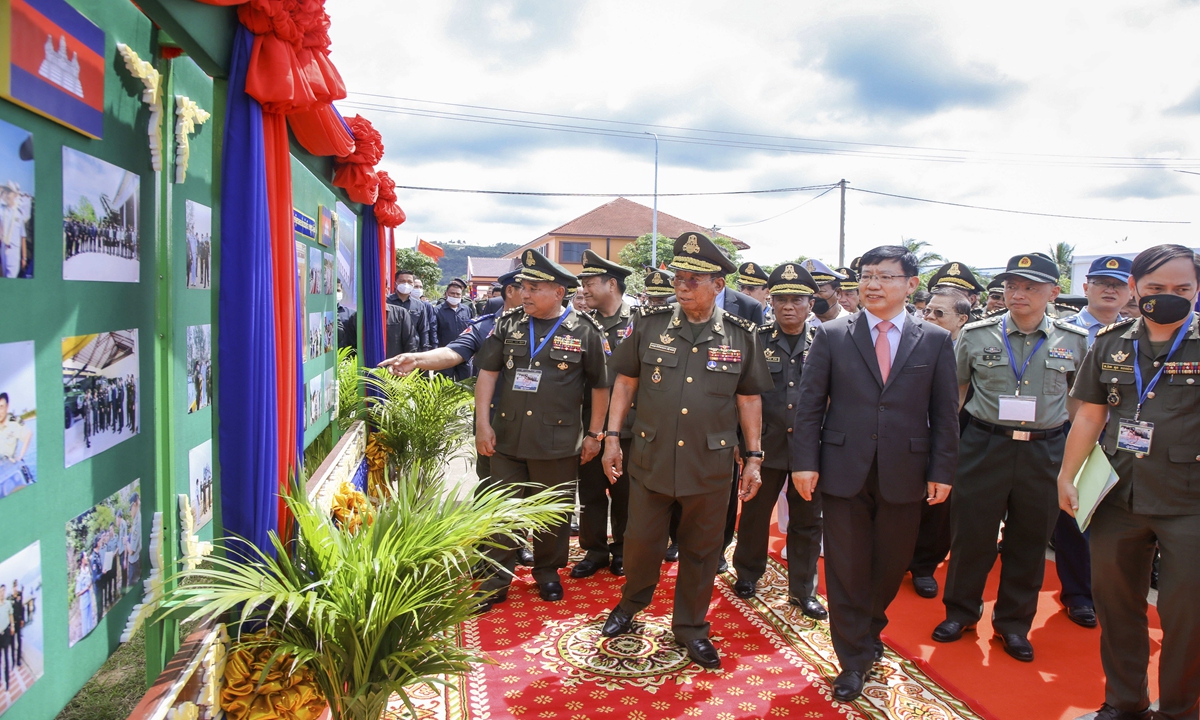
Cambodian Defense Minister Tea Banh, center left, and Chinese Ambassador to Cambodia Wang Wentian, center right, visit the site of the groundbreaking ceremony for an upgrade project in the Ream Naval Base, June 8, 2022. Photo: VCG
The China-assisted renovation of Cambodia's Ream Naval Base kicked off on Wednesday. Chinese Ambassador to Cambodia Wang Wentian, together with Cambodian Prime Minister Hun Sen's representative, Cambodian Deputy Prime Minister and Defense Minister Tea Banh, were among some 2,000 people who attended the ground-breaking ceremony. The normal cooperation project between China and Cambodia, which aims to "strengthen Cambodia's naval capacity to protect maritime territorial integrity and combat maritime crimes," has been discredited, blocked and sabotaged by the US, becoming another typical case of Washington's "coercive diplomacy."
The incident fully exposes US hegemonism, and shows that US hegemony does not work in sovereign countries that pursue independent and autonomous diplomacy, as Cambodia resisted extreme US pressure. It is clear that the international camp against hegemony is far more powerful than the geopolitical clique that Washington has taken great pains to pull together. The diplomatic principles of mutual respect, equality and mutual benefit that China adheres to and practices have gained worldwide recognition, support and resonance. In this regard, we have full confidence.
A recurring rumor in the US and Western public opinion is that China is secretly building a naval base in Cambodia for the exclusive use of the People's Liberation Army. This has been repeatedly debunked and refuted by China and Cambodia. Cambodia's constitution does not permit foreign military bases on Cambodian soil. The US has turned a blind eye to Cambodia's rumor-debunking voices with its insidious and poisonous intentions: to sow discord between China and Cambodia, to promote the "China threat theory," and to stab the Hun Sen administration, which is not well received by Washington, by insinuating that it had violated the constitution. This shows US' domineering attitude as it "calls a stag a horse."
To allay Washington's "doubts," Cambodia had allowed the defense attaché of the US Embassy in Phnom Penh to visit the Ream Naval Base. But the US pushed its luck and made even more outrageous demands. Prime Minister Hun Sen angrily said that "Ream Naval Base is not a place for thieves or robbers. You can say whatever you want. I allowed you to visit, not to investigate or inspect." This gets to the point. The US, which regards itself as the "world's policeman," obviously treats Cambodia as the target of law enforcement.
Over the years, many countries have been suppressed by the US because of their normal security or infrastructure cooperation with China. In cases such as the Solomon Islands, Equatorial Guinea, and the United Arab Emirates, the US' excuses are all rumors like "China wants to establish overseas military bases." As if it had become a crime. It must be stressed that it is the right of a sovereign country to "establish military bases abroad," and that right is recognized by international laws. In terms of whether and where to build those bases, it is another matter.
The US owns about 800 overseas military bases around the globe, much more than the combined number of overseas military bases owned by other countries. No matter how the US speaks with justice to portray its trick of "forbidding others to do what it is doing itself," it can't change the essence of its blatant coercion of diplomacy, which is a violation of other countries' legitimate rights.
In other words, although the US has always been acting like this, the international community cannot "become accustomed to it" and should firmly oppose and resist every bullying and coercion conducted by the US.
China adheres to the path of peaceful development and does not engage in military expansion or gunboat policy. So far, China has only one overseas military support base, which is in Djibouti. If one day, out of the need to safeguard national interests and assume international responsibilities and obligations, China decides to build new overseas supply bases, it will be aboveboard. China does not need to report to the US, let alone "prove its innocence." The US has no right to point fingers and interfere in the legitimate and mutually beneficial cooperation between other countries.
The Chinese version of Radio France Internationale's report on Ream Naval Base on Tuesday had an interesting headline: "Beijing expediates Asia-Pacific NATO." This exposes another genuine purpose of Washington's hype over the issue, namely, to seek rationality and legitimacy for its moves in creating an "Asia-Pacific version of NATO" and to pass the buck for the militarization of the Asia-Pacific to China. Washington is looking for nails all over the world with a hammer. This farce of "a thief crying stop thief" should end.




